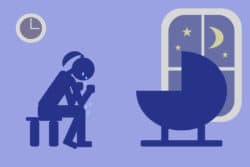Why Maternal Mental Health Matters
After giving birth, it’s normal for the focus to be on your baby getting the care it needs with appointments and regular checkups. What’s not so common is making sure that mothers get the mental health care they need postpartum. After childbirth, it’s completely normal to experience emotions that are extremely difficult to manage on top of taking care of your new
UNDERSTANDING POSTPARTUM DEPRESSION, Aren Gottlieb, MD (Video)
Postpartum depression is a condition that can affect women after they give birth. It can bring about feelings of sadness, depression, loneliness, restlessness, and anxiety. Overall, it can manifest with the following symptoms: Feeling sad or depressed. Frequent crying. Feeling restless or anxious. Loss of appetite. Less energy and motivation. Difficulty sleeping. Showing little interest
WHY WOULD SOMEONE BE DEPRESSED AFTER HAVING A BABY?, Aren Gottlieb, MD (Digital)
Having a baby is typically viewed as a wonderful, happy event in a woman’s life. About one in ten women who are up to 12 months postpartum (after giving birth) experience symptoms of depression and other mood disorders. Of course, people with a history of depression are more likely to experience Post Partum Depression (PPD)








